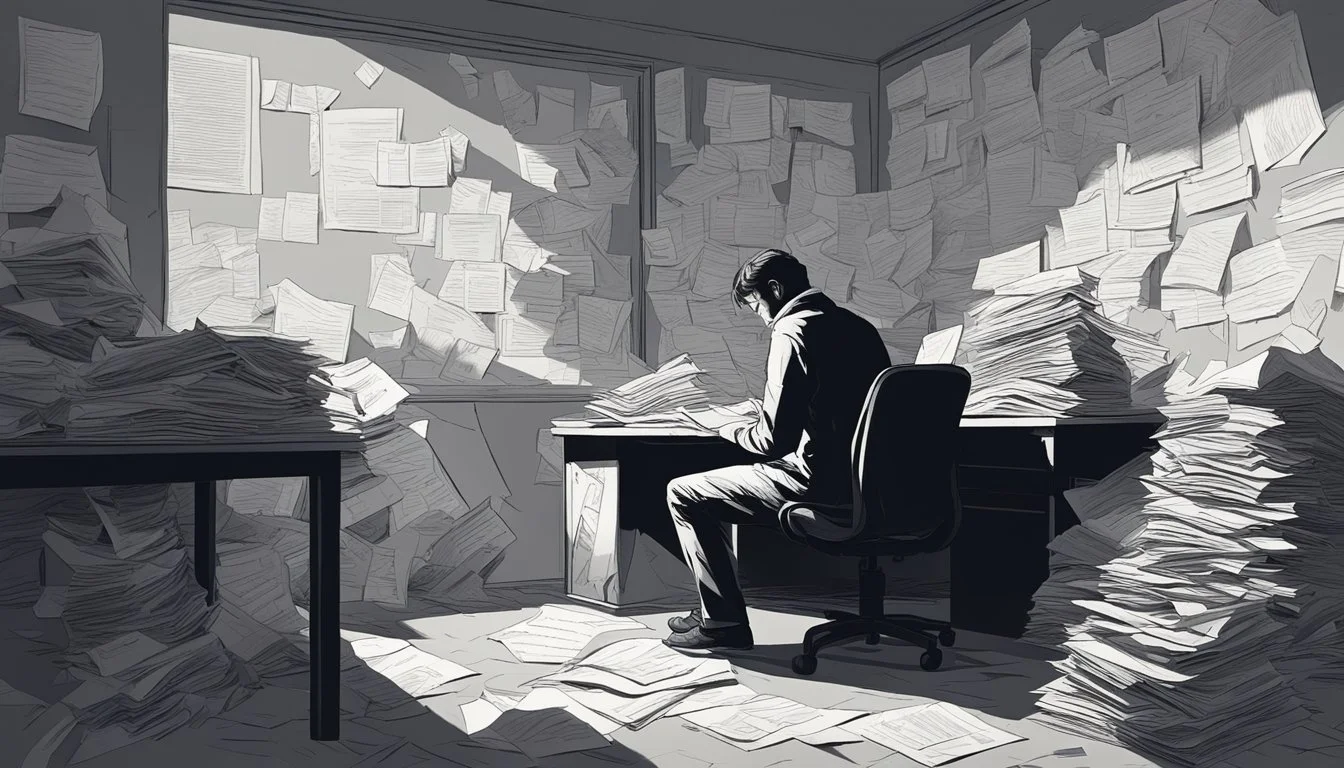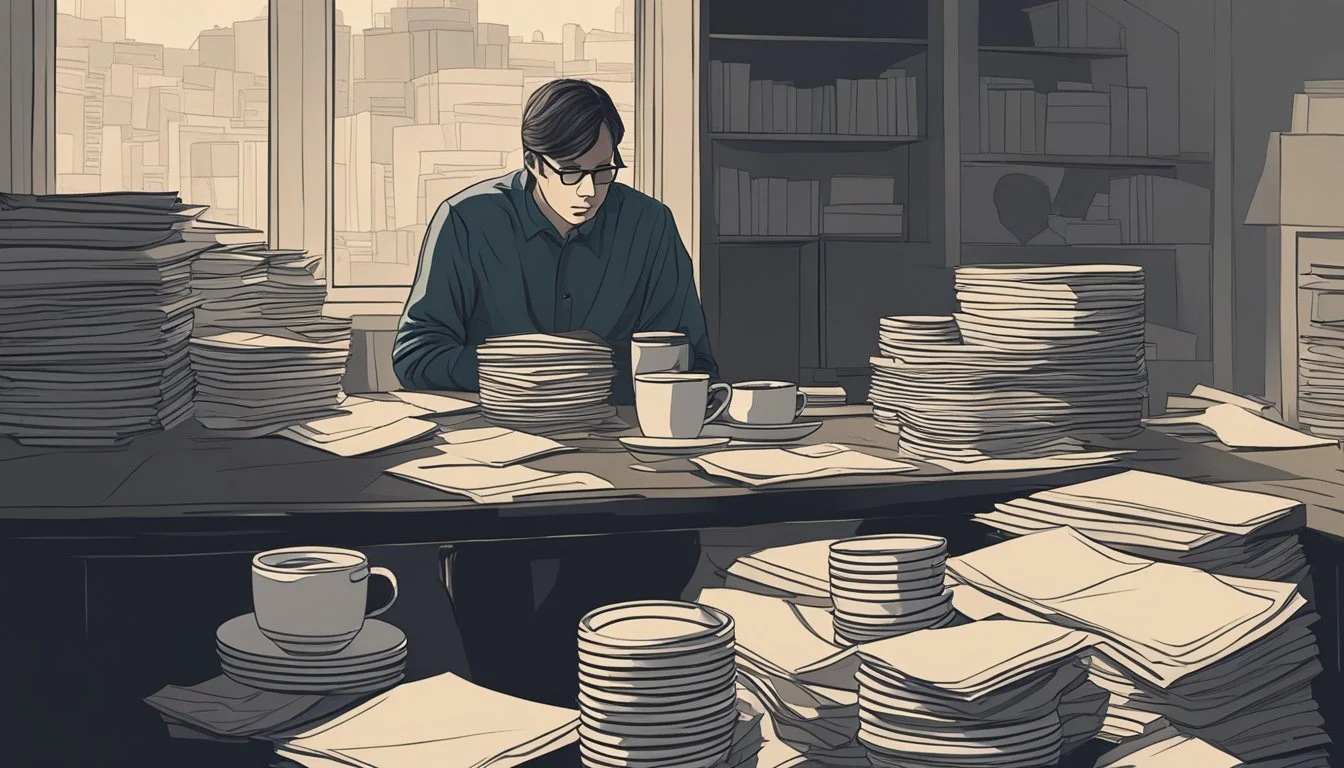Comedy and Crisis: Richard Jeni's Battle with Depression
A Comedian's Hidden Struggle
Richard Jeni, a beloved stand-up comedian renowned for his sharp wit and incisive humor, faced a hidden battle with depression that tragically ended his life. Despite his success in the comedy world, Jeni struggled with mental illness, highlighting the complex relationship between humor and inner turmoil
Jeni's story underscores the often-overlooked reality that even those who bring laughter to others may be fighting their own internal demons. His family revealed that he had been diagnosed with clinical depression and experienced bouts of psychotic paranoia, shedding light on the severity of his condition. This stark contrast between his public persona and private struggles serves as a poignant reminder of the invisible nature of mental health issues.
The comedy community and fans were left reeling from Jeni's untimely death, prompting discussions about mental health awareness in the entertainment industry. His legacy extends beyond his comedic talents, drawing attention to the importance of understanding and supporting those grappling with depression and other mental illnesses, even when their outward appearance may not reflect their inner pain.
The Life of Richard Jeni
Richard Jeni's journey in comedy was marked by talent, perseverance, and critical acclaim. His rise from Brooklyn roots to Hollywood success showcased his unique comedic voice and versatility as a performer.
Early Life and Career Beginnings
Richard Jeni was born and raised in Bensonhurst, Brooklyn, in an Italian-American Catholic family. He excelled academically, graduating with honors from Hunter College with a bachelor's degree in comparative politics.
Initially, Jeni pursued a career in public relations. However, after being let go from five firms in two years, he decided to try stand-up comedy. His first performance was at an open-mic night in Brooklyn.
This pivotal moment set Jeni on the path to becoming one of America's most respected comedians.
Rise to Fame
Jeni's quick wit and observational humor quickly gained attention in the comedy circuit. He became a regular performer on "The Tonight Show" with Johnny Carson and later with Jay Leno, making over 100 appearances.
His breakthrough came with HBO comedy specials, which showcased his polished material and impeccable timing. Jeni's popularity soared, leading to sold-out shows across the country.
In 1995, Jeni starred in the short-lived sitcom "Platypus Man," further expanding his reach in television comedy.
Major Works and Achievements
Richard Jeni's stand-up specials were his most acclaimed works. His HBO specials, including "Richard Jeni: Platypus Man" and "Richard Jeni: A Good Catholic Boy," received critical praise and multiple CableACE Award nominations.
Jeni's talent extended beyond stand-up. He appeared in films like "The Mask" alongside Jim Carrey and lent his voice to animated projects.
Comedy Central recognized Jeni's impact by ranking him #57 on their list of 100 Greatest Stand-ups of All Time in 2004. His influence continues to be felt in the comedy world, inspiring comedians like Bill Burr and Jim Gaffigan.
Understanding Mental Health
Mental health issues can affect anyone, including those in the entertainment industry. Depression, anxiety, and other conditions impact millions of people worldwide, often with serious consequences if left untreated.
Depression and the Entertainment Industry
Comedians and performers face unique mental health challenges. The pressure to constantly create new material and entertain audiences can be immense. Late nights, travel, and irregular schedules may disrupt sleep patterns and relationships.
Some comics use their struggles as inspiration for their work. However, this can sometimes mask deeper issues. The tragic case of Richard Jeni illustrates how even successful entertainers can battle severe depression behind the scenes.
Industry stigma around mental health may prevent some from seeking help. Increased awareness and support are crucial for those in high-pressure creative fields.
The Spectrum of Mental Illness
Mental health conditions exist on a spectrum of severity. Mild depression or anxiety may be manageable with therapy or lifestyle changes. More severe cases like clinical depression often require medical intervention.
Other serious conditions include:
Schizophrenia
Bipolar disorder
Obsessive-compulsive disorder
Post-traumatic stress disorder
These illnesses can significantly impair daily functioning. Proper diagnosis and treatment are essential. A combination of therapy, medication, and support can help many people manage symptoms effectively.
The Role of Clinical Depression
Clinical depression is a severe form of depression requiring medical treatment. It goes beyond temporary sadness or grief. Symptoms include:
Persistent low mood
Loss of interest in activities
Changes in sleep and appetite
Difficulty concentrating
Feelings of worthlessness
Suicidal thoughts
Brain chemistry imbalances play a key role. Antidepressants can help regulate neurotransmitters like serotonin. Therapy teaches coping strategies and addresses underlying issues.
Without treatment, clinical depression can be debilitating or even life-threatening. Seeking professional help is crucial for those experiencing symptoms.
The Battle with Mental Illness
Richard Jeni's struggle with mental health issues profoundly impacted his life and career. His experiences highlight the challenges faced by many public figures dealing with invisible illnesses.
Signs and Symptoms in Richard Jeni's Life
Richard Jeni exhibited several signs of mental illness throughout his life. He battled with depression, paranoia, and insomnia. These symptoms significantly affected his daily functioning and well-being.
Jeni was hospitalized in late 2006 for suicidal depression. This incident revealed the severity of his condition and the urgent need for professional intervention.
His family reported that Jeni's mental state had been deteriorating in the months leading up to his death. He experienced increased anxiety and struggled to maintain his usual routines.
Invisible Struggles of Public Figures
Many public figures, like Jeni, face unique challenges when dealing with mental health issues. The pressure to maintain a positive public image often conflicts with the reality of their internal struggles.
Comedians, in particular, may feel compelled to hide their pain behind a facade of humor. This dichotomy can exacerbate feelings of isolation and despair.
The stigma surrounding mental illness in the entertainment industry can deter individuals from seeking help. Fear of career repercussions may lead some to suffer in silence.
Impact of Mental Health on Career
Mental health issues can significantly affect a performer's career trajectory. In Jeni's case, his battle with depression and other symptoms likely influenced his work and professional decisions.
Despite his struggles, Jeni achieved considerable success in comedy. He was ranked 57th on Comedy Central's list of the 100 Greatest Stand-ups of All Time in 2004.
His ability to continue performing while dealing with mental illness speaks to his resilience and talent. However, the strain of maintaining a public persona while battling internal demons undoubtedly took its toll.
Jeni's tragic death in 2007 cut short a promising career and robbed the comedy world of a unique voice. His story serves as a stark reminder of the potentially devastating consequences of untreated mental illness.
Tragic End and Aftermath
Richard Jeni's battle with depression culminated in a shocking event that shook the comedy world. His untimely death sparked discussions about mental health in the entertainment industry.
Events Leading to the Apparent Suicide
On March 10, 2007, Richard Jeni was found with a self-inflicted gunshot wound in his West Hollywood home. His girlfriend, who was present at the time, called 911 after hearing a gunshot from the bedroom.
Jeni had been struggling with severe clinical depression and had sought medical help in the weeks leading up to the incident. He was prescribed antidepressants and anti-anxiety medication.
The Coroner's Report
The Los Angeles County Coroner's office confirmed Jeni's death as suicide. The report revealed he used a Colt Detective Special to take his own life.
Toxicology tests showed the presence of antidepressants in his system. The coroner noted Jeni had a history of depression and had been placed on a 51/50 hold previously, allowing medical professionals to detain him for evaluation.
Media and Public Response
News of Jeni's death sent shockwaves through the entertainment community. Fellow comedians and fans expressed their grief and disbelief on various platforms.
Many tributes highlighted Jeni's comedic genius and influence on the stand-up scene. His passing sparked conversations about mental health awareness in the comedy industry.
Several comedians used their platforms to advocate for better mental health support and destigmatization of depression among performers.
Comedy as a Reflection of Society
Comedy serves as a mirror to society, often addressing difficult topics through humor. Comedians play a crucial role in tackling taboo subjects and navigating personal struggles through their art.
Comedy and Crisis
Richard Jeni's career exemplified how comedy can reflect societal issues. His stand-up routines often touched on relatable life challenges, resonating with audiences. Jeni's appearances on "The Tonight Show" and his HBO specials showcased his ability to transform everyday frustrations into comedic gold.
The comedian's work highlighted social anxieties and cultural shifts. His observations on relationships, politics, and human behavior struck a chord with viewers. Jeni's comedy provided a lens through which people could examine their own experiences and societal norms.
Role of Comedians in Addressing Taboo Topics
Comedians often tackle subjects that are difficult to discuss in other forums. They use humor to broach sensitive issues, making them more accessible to audiences. This approach can spark conversations and promote understanding of complex topics.
Richard Jeni, like many of his peers, addressed mental health in his routines. His openness about personal struggles helped normalize discussions about depression and anxiety. By bringing these issues to light, comedians can reduce stigma and encourage empathy.
Comedy During Times of Personal Struggle
For many comedians, including Richard Jeni, their craft becomes a coping mechanism during difficult periods. The stage can serve as an outlet for expressing inner turmoil and finding connection with others.
Jeni's battle with depression influenced his work, adding depth to his comedy. His ability to find humor in dark times resonated with fans facing similar challenges. This connection between personal struggle and comedic expression highlights the therapeutic potential of laughter.
Comedy can provide both the performer and the audience with moments of joy amidst hardship. It offers a temporary escape and a shared experience that can be healing for all involved.
Legacy and Influence
Richard Jeni left an indelible mark on the comedy world. His unique style and sharp wit continue to inspire comedians and entertain audiences years after his passing.
Remembering Richard Jeni
Richard Jeni's comedy albums, DVDs, and videos preserve his legacy. His work remains popular among comedy enthusiasts and new generations of fans. Jeni's performances on "The Tonight Show with Jay Leno" are particularly memorable, showcasing his quick wit and impeccable timing.
Comedy Central ranked Jeni #57 on their list of the 100 Greatest Stand-ups of All Time in 2004. This recognition solidified his place among comedy legends.
Influence on Comedians and Industry
Jeni's impact on fellow comedians is significant. Notable comedians like Bill Burr, Jim Gaffigan, and Kevin James cite Jeni as an influence on their careers.
His approach to observational humor and storytelling set a high standard in the industry. Jeni's ability to find humor in everyday situations inspired many up-and-coming comics.
Chris Rock, a contemporary of Jeni, often spoke highly of his talent and comedic skill.
Contributions to Stand-Up Comedy
Jeni's comedy specials were groundbreaking in their format and content. He expertly blended personal anecdotes with social commentary, creating a unique comedic voice.
His work in film, including roles in "The Mask" and "National Lampoon's Dad's Week Off," broadened his audience and showcased his versatility as a performer.
Jeni won an American Comedy Award for "Best Male Stand-Up Comic" in 1995, recognizing his contributions to the art form.
His precise timing, clever wordplay, and ability to connect with audiences set a new standard for stand-up comedy performances.






